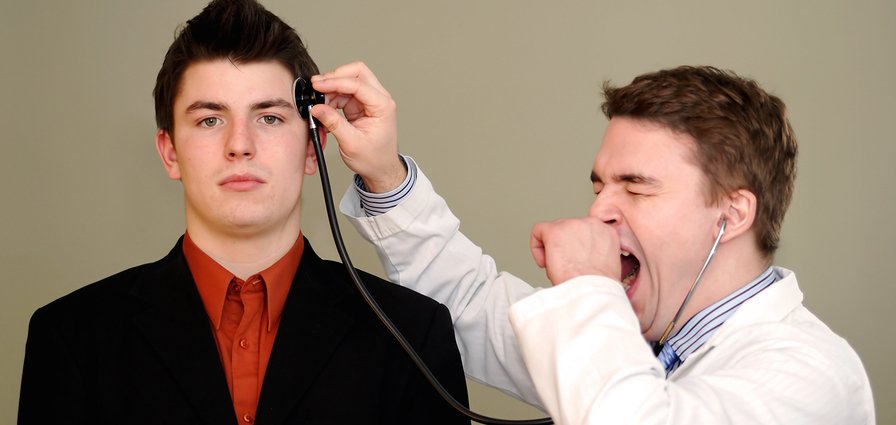Article Summary:
- The time of day that you see your doctor might have a big impact on the quality of care you receive.
- Doctors are more thorough early in the morning VS late in the afternoon–fatigue is likely a factor.
- If you can’t change when you have your appointments, then you have to take control during your appointment.
______________________________
If your physician’s practice is a busy one, you may take whatever slot you can get when you’re looking for an appointment. You’ll be accommodating to get squeezed in whenever they have an opening, whether it’s early morning before heading to work, a lunchtime visit, or taking off a little early for a late afternoon appointment. But maybe you shouldn’t be so flexible. According to new research, the time of day that you see your doctor might have a big impact on the quality of care you receive.
The study, which took place at the University of Pennsylvania in Philadelphia, found that physicians are more likely to give considerably more thorough care during morning appointments compared to those that take place late in the day.1Hsiang, Esther Y.; et al. “Association of Primary Care Clinic Appointment Time With Clinician Ordering and Patient Completion of Breast and Colorectal Cancer Screening.” JAMA Network Open. 10 May 2019. Accessed 22 May 2019. http://jamanetwork.com/journals/jamanetworkopen/fullarticle/2733171. These results are based on an investigation that included more than 52,000 patients visiting their primary care doctor for a checkup.
Cancer Screenings Ordered Most in the Mornings
Since the concept of providing quality care is very broad, for the purposes of this research, it was limited in scope to ordering cancer screenings for a patient. Obviously, this is just one aspect of many that were possible, but it may be a good indicator of whether a doctor is truly focusing on a patient’s overall health and specific disease risks. And the difference was substantial based on timing. For eligible subjects with 8 a.m. appointments, breast cancer screenings were ordered 64 percent of the time, while for 5 p.m. appointments, they were ordered for fewer than 48 percent of eligible subjects. Requests for colon cancer screenings were similar, with 36 percent of 8 a.m. appointments receiving screening orders, compared to 23 percent for patients seen at 5 p.m.
It appears that fatigue may be an important factor, since on average the percentage of screenings ordered was highest first thing in the morning, then steadily dropped across the next several hours. The screenings ordered then rose a bit again right around noon, only to steadily fall once more until hitting a low at day’s end. So, in other words, a physician might be fresh and clear-headed shortly after arriving at work, but—as with most of us at our jobs—as the day goes on, it gets harder to focus and there may be important things missed. What’s more, falling behind in scheduling as the day unfolds might bring on a rushed quality to a visit, and topics that aren’t related to an immediate complaint, like discussing necessary cancer screenings, may not be brought up out of expediency.
How to Ensure You’ll Receive Quality Care from Your Doctor
There are lots of ways to put this knowledge to good use and benefit from seeing your doctor at their very best, including:
- Schedule your checkups well in advance. You can keep tabs on when you are due for a physical and make your appointment long before you need it to guarantee you can choose that first slot of the day. This won’t do you much good when it’s a sick visit you need to schedule on short notice, but hopefully, your doctor can assess obvious symptoms well at any time of day.
- Base alternate times around your doctor’s hours. If your job or other responsibilities prevent you from being able to schedule an early morning appointment, don’t be shy when you speak with the office staff. Ask if there is a day that the doctor works a later shift, such as 1 p.m. to 9 p.m. and if so, choose the first appointment on that day of the week.
- Be your own best advocate. Whether you are healthy or sick, it is essential to learn to advocate for yourself. That means speaking up to your doctor to voice any questions or concerns you have about specific health issues or something being explained or recommended to you. And another important way to advocate for yourself is by doing some research before your appointment to become aware of what should be covered at the visit and what types of tests are considered standard at your age. This way, if your physician fails to bring something up, you can take the lead and make sure it’s acknowledged and discussed.
References
| ↑1 | Hsiang, Esther Y.; et al. “Association of Primary Care Clinic Appointment Time With Clinician Ordering and Patient Completion of Breast and Colorectal Cancer Screening.” JAMA Network Open. 10 May 2019. Accessed 22 May 2019. http://jamanetwork.com/journals/jamanetworkopen/fullarticle/2733171. |
|---|











